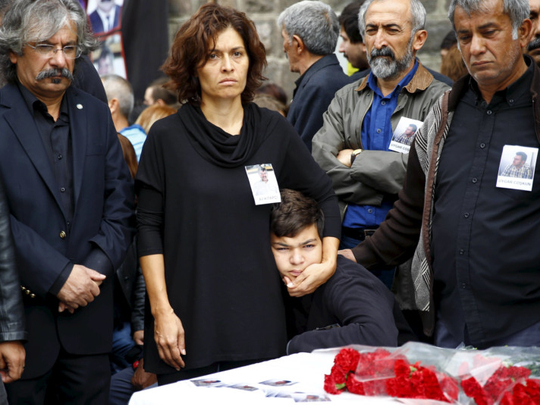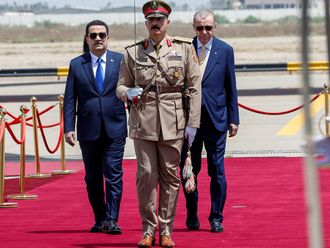
Ankara: Daesh is the primary suspect in the nation’s deadliest terror attack, interim Prime Minister Ahmet Davutoglu told NTV television on Monday, backing off from his earlier suggestion that Kurdish rebels might be to blame.
Two suicide bombers carried out the assaults on Saturday, Davutoglu said, adding that Turkey was close to identifying one of them by name. The attack before a peace march killed at least 97 people and wounded hundreds.
“We are primarily focusing on [Daesh],” Davutoglu said in a live interview with NTV. The attack, which was an attempt to overshadow the elections in Turkey, will not be able to “turn Turkey into Syria,” Davutoglu said. On Saturday, he had suggested Kurds or Daesh might be to blame.
The bombings have deepened the sense of insecurity that has mounted in Turkey ahead of a repeat election on November 1. The balloting was called to try to end the political stalemate that emerged after an inconclusive vote in June gave parliamentary representation to autonomy-minded Kurds for the first time.
Clashes between government forces and Kurdish PKK militants have surged since, and Turkey has been wary of becoming a battleground in the war between Kurdish fighters in neighboring Syria and Daesh.
Turkey’s lira weakened the most in emerging markets and bonds also slid.
Selahattin Demirtas, co-chairman of Turkey’s pro-Kurdish HDP party, accused the government and its supporters of blaming the bombings on Kurds, who figured heavily in the casualties, instead of sharing their “grief.”
Two of Turkey’s main labour unions went on a two-day strike Monday to protest the government’s failure to prevent the bombings. The labor groups, Kesk and Disk, have been joined in their walkout by the Turkish Medical Association and the union of architects and engineers.
Davutoglu promised to probe any possible security or intelligence lapse during the interview with NTV. Human Rights Watch faulted the government in a statement earlier in the day for “no known advances” in its investigation into two previous bomb attacks on the Kurdish political movement and leftist activists before the June elections.
“The event exposes huge flaws in the Turkish security apparatus that has been cracking down on the PKK for months, but neglected an equally serious and even more unpredictable threat such as [Daesh],” Cristian Maggio, head of Emerging Markets Research at TD Securities in London, said.
“As the country enters the final stage of the second election campaign this year, our concerns that political instability and security threats would increase are proving tragically accurate,” he said in an e-mailed report on Monday.
While the explosions in Ankara have hurt the country’s morale, “the climate of violence” in Turkey’s predominantly Kurdish southeast will have deeper impacts on the economy, Finance Minister Mehmet Simsek told AHaber television in an interview on Monday.
Simsek sounded skeptical that the November parliamentary election would resolve the political impasse that emerged after the June vote produced a hung parliament. There are “serious questions marks” regarding the outcome of the November election, he said.
While the ruling AK Party is strengthening support among its core constituency and may win 42.5 per cent of the vote, it will probably fall short of winning a majority in parliament, according to pollster Ozer Sencar, chairman of Ankara-based MetroPoll.
“Some AK Party supporters who avoided ballot boxes in June elections to show dissatisfaction with Erdogan were shocked to see their party lose its majority in parliament,” Sencar said by phone on Monday. “Almost all of them have decided to back the party again by now as they regard it as a pillar of stability.”
AKP received 40.9 per cent of the vote in June, after the pro-Kurdish HDP entered parliament and deprived it of the majority it had since 2002.
“With the latest polls still showing the AKP short of an absolute majority, in November we are likely to see a very polarized country, exposed to rising external and domestic threats, still without a clear government,” said Maggio, the TD Securities analyst.











